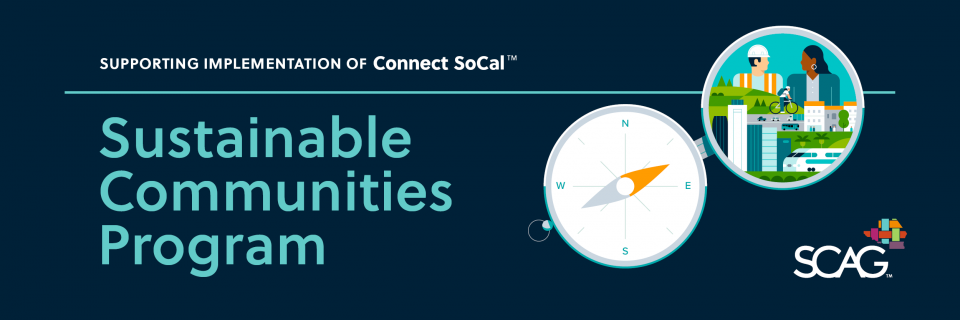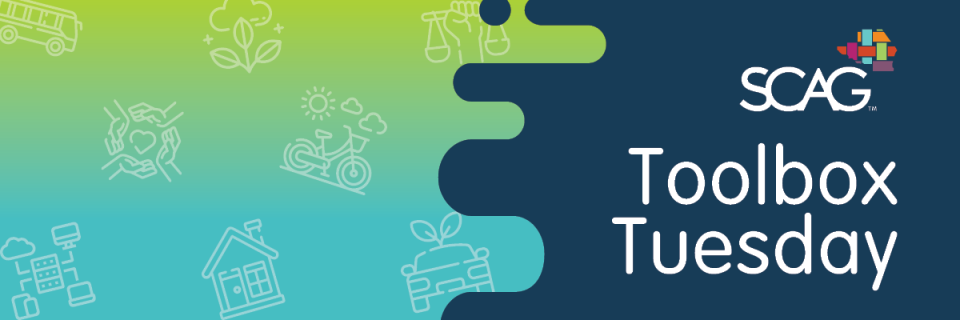Our Work
- Connect SoCal
- Inclusion, Diversity, Equity & Awareness
- Programs & Projects
- Housing
- Economy & Demography
- Federal & State Compliance
- Sustainable Development and Resilient Communities
- Transportation
- Active Transportation
- Planning For Main Streets
- Aviation Program
- Regional Pilot Initiatives Program
- Future Communities Pilot Program
- Transportation Demand Management
- Transit Program
- FreightWorks
- Passenger Rail Program
- Corridor Planning
- Transportation Safety
- Transportation Finance
- Intelligent Transportation Systems
- Southern California Transportation Study
- LA28 Games Mobility Program
- Local Resources
- Funding & Programming
- Legislation & Advocacy
- Publications & Reports
Local Resources
Broadband is essential infrastructure for the 21st century. Schools, offices, retail, entertainment, governments, and medical and public services rely on online platforms, offering significant time savings and a digital avenue for economic prosperity. However, broadband is still far from a universal service across the state. Within the SCAG region alone, approximately 15 percent of all households, disproportionately located in underserved, urban communities and rural communities, do not have access to adequate internet service.
Broadband is still considered relatively expensive, and studies show that prices are a significant barrier to access. Digital competency also plays a role, with nearly 52 percent of adults reporting they are “relatively hesitant” regarding new technologies and digital skills. Finally, physical infrastructural gaps create another significant barrier to adoption.
SCAG’s Commitment
SCAG’s Regional Council adopted Resolution No. 21-629-2 in February 2021, which pledges SCAG to assist in bridging the digital divide in underserved communities. The resolution recognizes the digital divide and directs staff to develop a broadband action plan and or program. Since the adoption of the resolution, SCAG has identified several key action items:
- Collect and invest in broadband data and develop detailed broadband maps and opportunity zones.
- Assist in securing funding for local jurisdictions and internet service providers to invest in broadband infrastructure in underserved communities.
- Conduct studies to develop solutions and strategies to assist in rapid deployment of broadband technology and technical studies that evaluate the benefits of broadband (e.g., reduced vehicle miles traveled).
SCAG is committed to helping bridge the digital divide and increase broadband access in underserved communities throughout Southern California.
- Broadband Permit Streamlining
- Regional Planning Resources
- Maps and Data
- State and Federal Initiatives and Funding Resources
Broadband Permit Streamlining

A lack of broadband infrastructure contributes to Southern California’s digital divide—the disparities in access to high-quality internet from community to community, and individual to individual. Removing permitting challenges—such as a lack of process transparency, high resource requirements, inconsistencies in fees, and long permitting processes—would ease infrastructure deployment and help bridge the digital divide.
SCAG’s “Broadband Permit Streamlining Report” and “Broadband Permit Streamlining Model Ordinance” provide model permitting standards and practices to help local governments and permitting agencies streamline deployment of broadband infrastructure in underserved areas.
Regional Planning Resources
- Resolutions
- Reports and Workshops
- Resources
- Governor’s Broadband Executive Order
- State Broadband Action Plan
- CPUC Broadband Mapping Initiative
- Infrastructure Investment and Jobs Act (IIJA)
- FCC Broadband Mapping Initiative
- SANDAG Story Map, “The Digital Divide in the San Diego Region”
- SANDAG Regional Digital Equity Strategy and Action Plan
- California Broadband Council, Broadband for All Action Plan
- CALCOG Broadband Resource and Policy Tracker
Maps and Data
Welcome to the Broadband Maps and Data Library.
- Fixed Broadband Map
- Community Anchor Institutions
- Community Anchor Institutions
- Community Anchor Institutions – Public Safety
- Community Anchor Institutions – Public Safety By County
- Community Anchor Institutions – Education
- Community Anchor Institutions – Education By County
- Community Anchor Institutions – Healthcare
- Community Anchor Institutions – Healthcare By County
- Community Anchor Institutions – Libraries
- Community Anchor Institutions – Libraries By County
- Public Subsidized Housing
- Fiber Presence
- Broadband Speed Test
- Broadband Affordable Plans
State and Federal Initiatives and Funding Resources
- Local Agency Technical Assistance Grants
The California Public Utilities Commission (CPUC) established the Local Agency Technical Assistance (LATA) grant program for eligible pre-construction work facilitating broadband network projects in areas in need. The program has a $50 million budget for eligible local agencies and Tribal entities in California, including $5 million set aside for Tribes.
The LATA program began accepting grant applications on Aug. 1, 2022. In total, the LATA Program awarded $50 million in funding to 106 local agencies and Tribal organizations in California.
More information and application materials can be found on the LATA program website.
Statewide Open-Access Middle-Mile Network
Signed into law in July 2021, Senate Bill 156 invests $6 billion statewide over three years to expand broadband infrastructure, improve affordability, and enhance access to broadband for all Californians. This includes constructing a $3.25 billion state-owned open-access middle-mile broadband network. In November 2021, the California Department of Technology announced a significant investment in broadband infrastructure, identifying 18 initial broadband projects statewide and four corridors in the SCAG region. For more information, visit the California Department of Technology website
- Infrastructure Investment and Jobs Act
With the passage of the Infrastructure Investment and Jobs Act (IIJA), Congress took a significant step forward in providing broadband access to the entire country. The IIJA invests $65 billion in broadband, for which $48.2 billion will be administered by the newly established Office of Internet Connectivity and Growth in the National Telecommunications and Information Administration (NTIA). This investment will leverage NTIA’s experience in promoting broadband infrastructure development and digital inclusion efforts through its Broadband USA initiative as well as current grant programs, including the Broadband Infrastructure Program, the Tribal Broadband Connectivity Program, and the Connecting Minority Communities Pilot Program. Additionally this investment will enhance other, established Federal broadband initiatives offered through the U.S. Treasury, U.S. Department of Agriculture, and the Federal Communications Commission. For more information, visit the Broadband USA website.
- Partnership to Close the Digital Divide
SCAG and the San Diego Association of Governments (SANDAG) conducted a joint request for qualifications to seek partnerships to deploy broadband infrastructure and provide high-quality and affordable broadband service to residents, businesses, public agencies, educational institutions, and Tribes in the Southern California region. Selected firms will be short-listed and may co-author grant applications with SCAG and SANDAG to obtain funding for broadband projects. For more information on this competitive process, contact Roland Ok at Ok@scag.ca.gov.
SCAG's Go Human community engagement program aims to reduce traffic collisions in Southern California and encourage people to walk and bike. SCAG works to create safer and more connected communities by sharing resources for engagement, education, information, projects, and events.
Go Human is funded by grants from the California Office of Traffic Safety, the California Active Transportation Program, the Safe Streets and Roads for All program, and sponsors.
SCAG Safety Pledge
SCAG’s Go Human Safety Pledge invites jurisdictions to commit to designing and building safer streets that promote walking, biking, and community connections.
By signing the Safety Pledge, jurisdictions, organizations and individuals can become safety leaders in the SCAG region. Signatories receive access to SCAG resources, receive recognition for being a safety champion, and join SCAG’s growing safety cohort. Signatories can pledge to implement or sponsor a safety messaging campaign, deploy a temporary demonstration with the Go Human Kit of Parts, advocate for safety improvements using the Regional High Injury Network, and much more.
Make a commitment to safety today by signing the Safety Pledge.
Signing the Safety Pledge also allows jurisdictions, organizations, and individuals to view their commitment on the Safety Pledge Map.
This real-time map publishes signatures right after signing and map filters are available to see what organizations and jurisdictions have signed the pledge.
Questions?
Email gohuman@scag.ca.gov with any questions.
Follow us!
Stay informed about the campaign by signing up for our newsletter and following Go Human on Facebook, Twitter, Instagram and LinkedIn.
Our Sponsors
SCAG thanks all of our generous Go Human sponsors for their continued efforts to improve traffic safety and encourage biking and walking throughout the region. To learn more about how to become a Go Human sponsor, view our Sponsorship Opportunities page.
 The Sustainable Communities Program (SCP) strengthens partnerships with local agencies and strategic partners responsible for land use and transportation decisions, offering technical assistance and financial resources to meet the diverse planning needs of local communities and support implementation of regional planning policies and strategies. SCAG is currently providing technical assistance to 57 local agencies and has funded 110 projects, totaling over $21.6 million, since 2016.
The Sustainable Communities Program (SCP) strengthens partnerships with local agencies and strategic partners responsible for land use and transportation decisions, offering technical assistance and financial resources to meet the diverse planning needs of local communities and support implementation of regional planning policies and strategies. SCAG is currently providing technical assistance to 57 local agencies and has funded 110 projects, totaling over $21.6 million, since 2016.
Build Your Skill Set and Strengthen Your Community

Complementary Professional Development
In alignment with SCAG’s strategic goals to produce innovative solutions that improve the quality of life for Southern Californians and be the foremost data information hub, Toolbox Tuesday aims to provide a range of planning knowledge and technical skills for local planners including training on various tools and resources on emerging planning topics such as equity, environmental justice, traffic safety, housing, transportation, sustainability, spatial analytics, programming language, and data literacy.
Toolbox Tuesday offers professional, complementary, and virtual training to local government staff and other stakeholders within our six-county region through the monthly webinar. As a bonus, most trainings provided through Toolbox Tuesday are eligible for AICP Certification Maintenance credits.
Trending and Timely Topics
Toolbox Tuesday provides a quick, one-half-hour-long focus on a single subject. The sessions are planned at a level that a variety of people—including elected officials, local planners, community organizers, students, and community members—can gain practical skills and knowledge on timely planning issues. Offering this training virtually and free of cost provides all local jurisdictions access to high-quality training and technical assistance. By bringing together planners from diverse areas in the region, the sessions allow jurisdictions to share and learn from each other about the successes and nuances on various planning topics.
For additional information regarding technical assistance and feedback about Toolbox Tuesday, please contact the Local Information Services Team (LIST) at list@scag.ca.gov.
Upcoming Toolbox Tuesday Training

Broadband is essential infrastructure for the 21st century. Schools, offices, retail, entertainment, governments, and medical and public services rely on online platforms, offering significant time savings and a digital avenue for economic prosperity. However, broadband is still far from a universal service across the state. Within the SCAG region alone, approximately 15 percent of all households, disproportionately located in underserved, urban communities and rural communities, do not have access to adequate internet service.
 Community Outreach and Advertising
Community Outreach and Advertising
Go Human is a community engagement program with the goals of reducing traffic collisions in Southern California and encouraging people to walk and bike more. We hope to create safer and more connected communities by making resources available for engagement, education, information sharing, projects and events.
Go Human is funded by grants from the California Office of Traffic Safety, the California Active Transportation Program, the Mobile Source Air Pollution Reduction Review Committee and from our sponsors.
 The Sustainable Communities Program (SCP) strengthens partnerships with local agencies and strategic partners responsible for land use and transportation decisions, offering technical assistance and financial resources to meet the diverse planning needs of local communities and support implementation of regional planning policies and strategies. SCAG is currently providing technical assistance to 57 local agencies and has funded 110 projects, totaling over $21.6 million, since 2016.
The Sustainable Communities Program (SCP) strengthens partnerships with local agencies and strategic partners responsible for land use and transportation decisions, offering technical assistance and financial resources to meet the diverse planning needs of local communities and support implementation of regional planning policies and strategies. SCAG is currently providing technical assistance to 57 local agencies and has funded 110 projects, totaling over $21.6 million, since 2016.
Build Your Skill Set and Strengthen Your Community

Complementary Professional Development
In alignment with SCAG’s strategic goals to produce innovative solutions that improve the quality of life for Southern Californians and be the foremost data information hub, Toolbox Tuesday aims to provide a range of planning knowledge and technical skills for local planners including training on various tools and resources on emerging planning topics such as equity, environmental justice, traffic safety, housing, transportation, sustainability, spatial analytics, programming language, and data literacy.
Toolbox Tuesday offers professional, complementary, and virtual training to local government staff and other stakeholders within our six-county region through the monthly webinar. As a bonus, most trainings provided through Toolbox Tuesday are eligible for AICP Certification Maintenance credits.